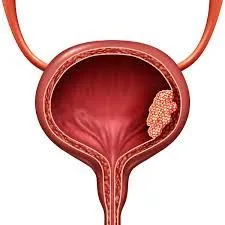Bladder Cancer
Bladder cancer services offered in Milton Keynes and Oxford

Bladder Cancer
Bladder cancer is a serious condition that requires prompt attention. With early detection and expert care, the chances of successful treatment are significantly improved. Mr. Angus Campbell specializes in the diagnosis and treatment of bladder cancer, offering state-of-the-art care in Oxford and Milton Keynes. Schedule a consultation today for a comprehensive evaluation and a personalized treatment approach.
What is Bladder Cancer?
Bladder cancer occurs when cells in the bladder lining grow uncontrollably, often causing blood in the urine. This common cancer, particularly in older adults, can also lead to painful urination, frequent urges to urinate, or a sense of incomplete bladder emptying.
What symptoms might bladder cancer cause?
Bladder cancer often begins with symptoms that may seem mild but should not be ignored. Recognizing these signs early is crucial for effective treatment. Common symptoms include:
*Blood in the urine (hematuria): This is the most common symptom. Your urine may appear pink, red, or brown. Sometimes, the blood isn’t visible to the naked eye and is only detected through a urine test.
*Pain or discomfort during urination: A burning or stinging sensation while urinating can be an early sign of bladder irritation or cancer.
*Frequent or urgent need to urinate: You may feel the need to urinate more often than usual or experience sudden, intense urges to go, even if your bladder isn’t full.
*Pelvic pain: Discomfort or pain in the lower abdomen or pelvic area can indicate advanced stages of the disease.
*Weak or interrupted urine stream: Difficulty maintaining a steady stream of urine can also signal bladder issues.
If you notice any of these symptoms, it’s important to seek medical advice promptly. While these signs may also point to other conditions, such as infections, they should always be evaluated.
How is Bladder Cancer Diagnosed?
Diagnosing bladder cancer involves a step-by-step approach to understand your symptoms and identify the cause. Here’s what to expect:
Medical History and Physical Exam:
Your doctor will ask about your symptoms, lifestyle, and any family history of cancer or bladder-related issues.
A physical exam may include checking your abdomen and pelvic area for any abnormalities.
Urine Tests:
Urine cytology: A sample of your urine is examined under a microscope to look for cancerous or abnormal cells.
Additional urine tests may also check for biomarkers linked to bladder cancer.
Cystoscopy:
This procedure allows the doctor to look inside your bladder using a thin, flexible tube with a camera (cystoscope). This test helps identify any suspicious growths or abnormalities.
Imaging Studies:
Tests like a CT scan, MRI, or ultrasound may be performed to visualize the bladder and surrounding organs. These images help assess the size, location, and spread of the tumor.
Each step in the diagnostic process is designed to provide a clear picture of your condition, allowing your healthcare team to create the most effective treatment plan for you.
What Treatments Are Available for Bladder Cancer?
Bladder cancer treatments vary depending on the stage (how far the cancer has spread) and grade (how aggressive the cancer cells are). Mr. Angus Campbell works within a multidisciplinary team of experts to ensure every patient receives personalized care. Common treatment options include:
Transurethral Resection of Bladder Tumor (TURBT):
This is a minimally invasive procedure often used to treat early-stage bladder cancer.
During TURBT, a small instrument is passed through the urethra to remove the tumor from the bladder lining.
This procedure is typically performed under anesthesia, and most patients can go home the same day.
Intravesical Therapy:
This treatment involves placing medication directly into the bladder through a catheter.
Chemotherapy: This uses drugs to kill cancer cells and prevent recurrence.
Immunotherapy: Treatments like BCG (Bacillus Calmette-Guérin) are designed to stimulate your immune system to fight the cancer cells.
Intravesical therapy is often recommended after TURBT to reduce the risk of the cancer coming back.
Cystectomy:
In more advanced cases, partial or complete removal of the bladder (cystectomy) may be necessary.
A partial cystectomy removes only the affected portion of the bladder, preserving as much function as possible.
A radical cystectomy removes the entire bladder and nearby lymph nodes. When the bladder is removed, reconstructive surgery can create a new way for urine to leave your body (such as a urostomy or neobladder).
Your treatment plan will depend on your specific diagnosis, overall health, and personal preferences. Mr. Campbell and his team will guide you through every step, ensuring you feel informed and supported.
How Does the Multidisciplinary Approach Help?
All cases of bladder cancer treated by Mr. Campbell are discussed within a multidisciplinary team (MDT). This group includes surgeons, oncologists, radiologists, pathologists, and other specialists. Working together, they:
Review your test results and medical history.
Discuss the best treatment options based on your unique situation.
Ensure you receive a comprehensive care plan that considers all aspects of your health.
This team approach ensures that every decision about your care is backed by expert opinions and the latest medical evidence.
What Happens After Treatment?
Recovery and follow-up care are important parts of your journey. Here’s what to expect after treatment:
Monitoring for Recurrence:
Bladder cancer has a tendency to return, so regular follow-up appointments are crucial.
You may need periodic cystoscopies or urine tests to check for any signs of recurrence.
Managing Side Effects:
Some treatments, like intravesical therapy or surgery, may cause temporary side effects such as bladder irritation, fatigue, or changes in urination habits.
Mr. Campbell’s team will provide guidance on managing these symptoms and improving your quality of life.
Lifestyle Adjustments:
Maintaining a healthy lifestyle, including staying hydrated and avoiding smoking, can lower your risk of recurrence.
Mr. Campbell will provide personalized advice on lifestyle changes to support your recovery.
Schedule Your Consultation
If you’re experiencing symptoms of bladder cancer, such as blood in your urine or frequent urination, or if you have concerns about your bladder health, it’s important to seek expert care.
Contact Mr. Angus Campbell’s offices in Oxford or Milton Keynes to schedule a consultation. With compassionate, personalized care, Mr. Campbell will help you understand your condition and explore the best treatment options for your needs.
Book your appointment today and take the first step toward better bladder health.
STILL NOT SURE?
Frequently Asked Questions about Bladder Cancer
What causes bladder cancer?
Bladder cancer occurs when cells in the bladder grow abnormally and uncontrollably. While the exact cause isn’t always known, risk factors include smoking, exposure to certain chemicals, chronic bladder irritation, and a family history of cancer.
Is blood in the urine always a sign of bladder cancer?
No, blood in the urine can also be caused by other conditions like urinary tract infections, kidney stones, or an enlarged prostate. However, it’s important to have this symptom checked by a doctor to rule out serious issues like bladder cancer.
Is bladder cancer treatable?
Yes, bladder cancer is treatable, especially when detected early. Treatment options like TURBT, intravesical therapy, and cystectomy are highly effective, depending on the stage and grade of the cancer.
Will I need to stay in the hospital after treatment?
This depends on the type of treatment you receive. Many procedures, such as intravesical therapy, are outpatient treatments, meaning you can go home the same day. More extensive surgeries, like a cystectomy, may require a hospital stay.
Can bladder cancer come back after treatment?
Bladder cancer has a higher recurrence rate than some other cancers, which is why regular follow-ups with your doctor are essential. Monitoring through cystoscopies and urine tests helps catch any recurrence early.
What lifestyle changes can reduce my risk of recurrence?
Quitting smoking, staying hydrated, and following a balanced diet are key lifestyle changes that can lower your risk of recurrence. Your doctor will provide personalized advice to help you maintain your health after treatment.
Does bladder cancer always require surgery?
Not always. Early-stage bladder cancer may be treated with minimally invasive options like TURBT or intravesical therapy. Surgery, such as cystectomy, is typically reserved for more advanced cases.
How soon can I return to work after treatment?
Most patients can resume light activities within a few days of outpatient treatments like TURBT. For more extensive procedures, recovery time will vary, and your doctor will provide specific guidance based on your case.
Are there side effects from bladder cancer treatments?
Side effects depend on the treatment. Common side effects include temporary bladder irritation, fatigue, or changes in urination habits. Mr. Campbell and his team will provide support to manage these symptoms and ensure a smooth recovery.
How do I schedule an appointment?
You can contact Mr. Angus Campbell’s offices in Oxford or Milton Keynes to schedule a consultation. Early evaluation ensures prompt diagnosis and treatment, improving your chances of a successful outcome.

Innovation
Fresh, creative treatment.

Integrity
Honesty and transparency.

Excellence
Top-notch services.
Copyright© Angus Campbell 2024. All Rights Reserved| Privacy Policy | Terms of Service | Website by The Higher League

